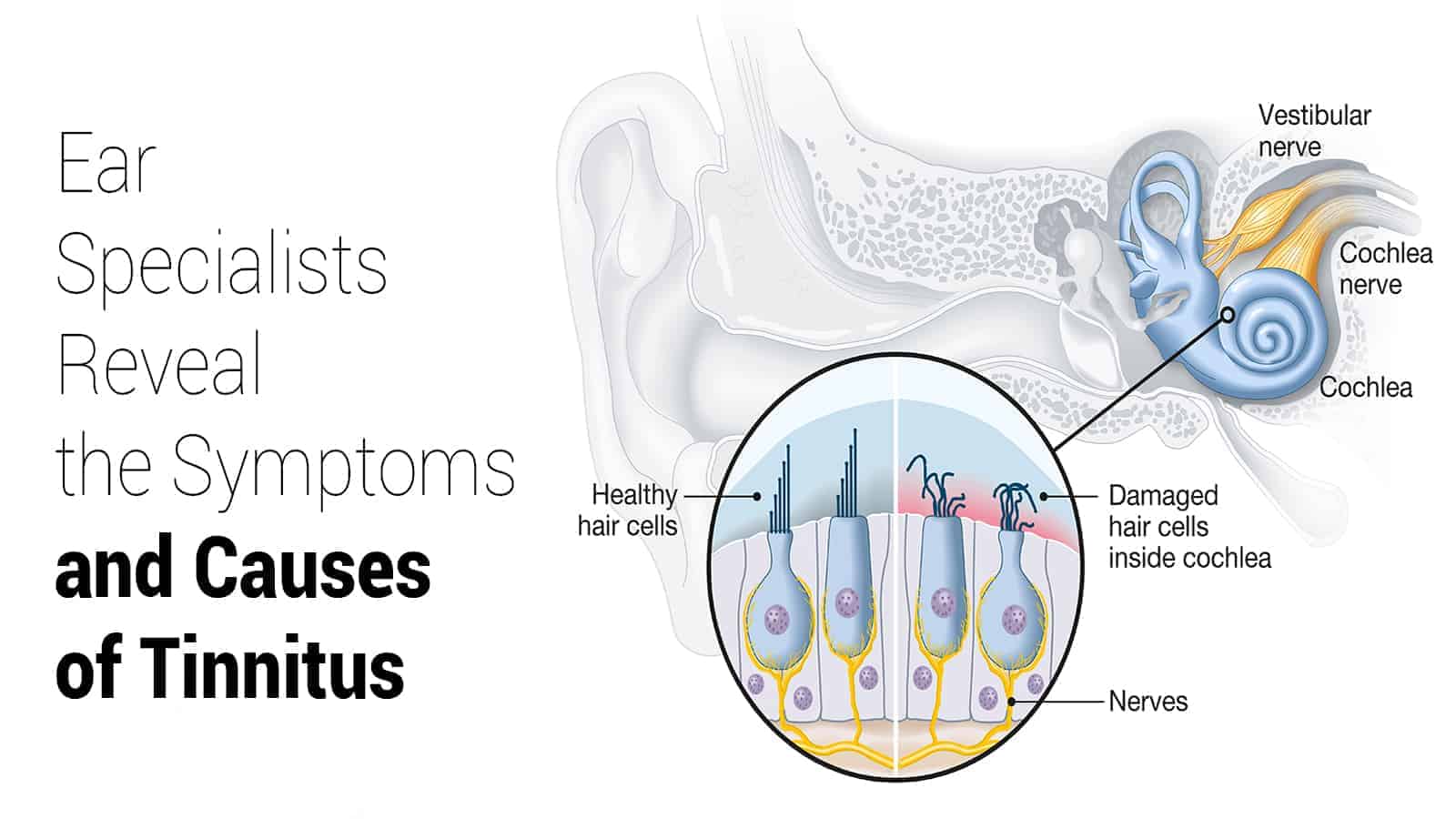Tinnitus is a hearing-related problem that causes noises or ringing in one or both ears. The ringing in the ears may cause anxiety, depression, and stress. You can’t read, sleep or talk to a friend without hearing a humming noise in your ears. The noise from tinnitus isn’t from external noise, but it’s due to an underlying condition. Nevertheless, there is hope for sufferers of tinnitus. By doing this one thing, you can temporarily help find relief.
What are the symptoms of tinnitus?
Approximately sixty million adults in the United States have tinnitus. It’s most common in adults 55 and older. It rarely leads to hearing loss, but it’s an annoying condition for sufferers. People describe this noise in different ways, such as:
- Cicadas sounds
- Crickets
- Grinding sounds
- Steam escaping
- Buzzing
- Hissing
- Humming
- Roaring
- Wind blowing
- Running engine
- Fluorescent lights humming

It’s thought that the type of noise you hear is due to neuron activity in parts of your ears. You can experience the buzzing in one or both ears. The noise from this condition often interferes with your ability to focus or to hear other sounds. Tinnitus sometimes comes and goes, or it can be permanent. Sometimes, the sounds have a rhythm associated with a heartbeat called pulsatile tinnitus.
What causes tinnitus?
People who have some hearing loss may experience tinnitus. If you have hearing loss, your brain gets less auditory information causing it to make sounds and tinnitus. Other things that can cause tinnitus include the following:
- Anxiety and stress
- Loss of sleep
- Certain medications-aspirin and chemotherapy drugs
- Injury
- Tension in a part of your body like your head or jaw
- Earwax buildup in your outer ear
- Dental problems: Teeth or jaw problems like clicking or getting dental work. A night guard may help relieve the ringing in your ears.
- Head injuries: Car accidents where you bump your head or neck injuries.
- Some diseases: Meniere’s disease causes too much fluid buildup in your inner ear. Also, high blood pressure and diabetes may cause tinnitus.
How does tinnitus affect your quality of life?
Some individuals find the constant ringing or buzzing noises exceedingly bothersome. It affects their quality of life, including these unfavorable outcomes:
- Interrupting sleep
- Causes irritability
- Loss of concentration
- Depression and anxiety
- Suicidal thoughts
Doing This ONE Thing Can Temporarily Help Tinnitus
Some people who have ringing in the ears explain on Twitter how they relieve their discomfort by doing this one thing. Some users find it helpful, others found less relief but said it was at least worth a try. Of course, you should check with your doctor before engaging in any new therapy.
Here are the steps, as explained by Dr. Jan Strydom:
- Place your palms over your ears.
- Be sure your fingers are resting on the back of your head.
- Your middle fingers are pointing toward each other just above your skull base.
- Now put your index fingers on top of your middle fingers.
- Snap them with your index fingers, so they hit your skull, making a loud drumming noise.
Some people get immediate relief when they do this. It would be best if you repeated this twice daily for as long as necessary to reduce the tinnitus sounds. Many say this has helped them, but scientists aren’t sure why.
Because there are different causes of tinnitus, scientists think that whether or not you get relief from doing this will depend on what’s causing your tinnitus. For example, if your tinnitus results from jaw muscle tension, they suggest you find ways to reduce your stress to find relief from the ringing in your ears. Gentle stretches or yoga can also help reduce tension in your jaw, head, and neck.
What other treatments help relieve the ringing in the ears?
There isn’t a known cure for this ringing in the ears, but there are different ways to find relief. Treatments that may help you include these:
- Counseling: A therapist or counselor can help you with your anxiety and stress.
- Sound therapy: Sound therapy involves using other sounds to ease tinnitus sounds. There are online sites that offer background sound to help reduce your tinnitus. Check out these sounds to see if they help you.
- On-ear generators: These are little devices worn on your ear that make constant low-level noises to help make the humming sounds.
- White noise machines: This device makes a static or falling rain sound, effectively relieving people from tinnitus. In addition, there are white noise pillow speakers to help you sleep. Fans, humidifiers, air conditioners,s, and dehumidifiers also reduce ringing in the ears at night.
- Behavior therapy: This therapy aims to teach people to live with this condition by changing how they feel and think about the symptoms and helping them feel less bothered by them.
- Tinnitus retraining therapy (TRT): TRT is a unique treatment done by an audiologist at a tinnitus treatment center. They use sound masking and therapy in this treatment. You wear a device that helps mask the symptoms during your therapy. The TRT can help you be less affected by the discomfort as time passes.
- Cognitive behavior therapy (CBT): This form of counseling comes from a mental health professional or psychologist. They offer techniques to help you cope with tinnitus symptoms, so they don’t bother you as much.
- Remove earwax: Excess earwax may help you find relief.
- Blood pressure treatment: Treating blood pressure may decrease the symptoms.
- Changing your medication: Certain medications cause tinnitus. Talk to your doctor about changing your medications to eliminate the ringing in the ears.
- Hearing aids: Hearing aids may help ease or eliminate the symptoms.
What are the different types of tinnitus?
Tinnitus is common, but it isn’t straightforward because it presents in different ways, and there are four different types of this condition.
- Subjective tinnitus: This is a common type. It stems from exposure to loud sounds for some time. It appears and then suddenly disappears. Subjective tinnitus can last for three months to twelve months. In some cases, it never goes away.
- Neurological tinnitus: This type comes from a disorder such as Meniere’s disease, which affects the brain’s auditory processes.
- Somatic tinnitus: This tinnitus arises from something wrong with your sensory system.
- Objective tinnitus: Objective tinnitus is a rare type caused by involuntary muscles contracting or deformed vascular areas. It’s treat
There are also some subgroups of tinnitus.
- Musical tinnitus: People with this condition hear layers of tones that sound like melodies or compositions.
- Pulsatile tinnitus: If you hear a rhythmic humming that is in sync with your heartbeat, you have this type of tinnitus. The sound you’re hearing is blood flowing to the blood vessels around your ears.
- Low-frequency tinnitus: This is a very confusing type of this condition in which someone can’t determine if the ringing in the ears is external or internal. Sufferers say the tones are low octaves like those on a piano. They describe the sounds as rumbling, humming, or deep droning. Low-frequency tinnitus affects people the most.
What foods could help relieve tinnitus?
Today, there is no cure for tinnitus, but what you eat could help you manage your symptoms. Some suggest that certain foods set off signs. Here are foods that may help you manage the ringing in the ears.
- Zinc: Zinc heals and improves cell growth. Eat plenty of chicken, nuts, spinach, kale, dark chocolate, and shellfish.
- Potassium: Potassium regulates the flow of fluids in your body. Eat sweet potatoes, bananas, yogurt, mangoes, and apples.
- Vitamin B12: Vitamin B12 may alleviate some humming and buzzing sounds due to hearing damage. In addition, foods like eggs, chicken, salmon, and mackerel are high in these vitamins.
- Folate: Folate may improve the blood flow to your ears. It may help with age-related hearing loss. Eat leafy greens like spinach, kale, broccoli, asparagus, and bok choy.
- Bromelain: Bromelain reduces inflammation in your body. Eat pineapple and ginger.
How does tinnitus affect your emotions?
A recent study found that people who experience ringing in the ears process emotions differently than people with normal hearing. Science professor at the University of Illinois, Fatima Husain, said that she knew tinnitus causes anxiety and depression. Still, she wanted to understand how tinnitus affected the brain’s ability to react to emotions. Some participants had moderate hearing loss with milk tinnitus, others without tinnitus, and another group had no hearing loss or tinnitus. Each individual listened to different sounds, some pleasant, some not so nice, while inside an MRI machine.
Then, participants pushed a button to determine whether the sounds were pleasant, neutral, or unpleasant. All the tinnitus participants reacted slower than participants with normal hearing. They expected that people with tinnitus would have higher activity in brain regions, but the opposite was true. Husain speculates this is because these individuals had to adjust to constant noise. As a result, their brains had to reduce activity and reroute to other parts of their brain. She hopes these findings will help tinnitus sufferers’ quality of life.

Final thoughts on the ONE thing to temporarily help relieve ringing in the ears
Tinnitus is a common problem for many adults in the United States. This ringing in the ears can cause depression, stress, and anxiety. It may interrupt your sleep, talking to others, and your ability to function at work. It’s thought that people with the condition may process emotions differently because their brains work overtime to adapt to the humming, whooshing, and buzzing sounds. If you suffer from the buzzing sounds, try this technique to relieve your symptoms temporarily.
The post Doing This ONE Thing Can Temporarily Help Tinnitus appeared first on Power of Positivity: Positive Thinking & Attitude.








